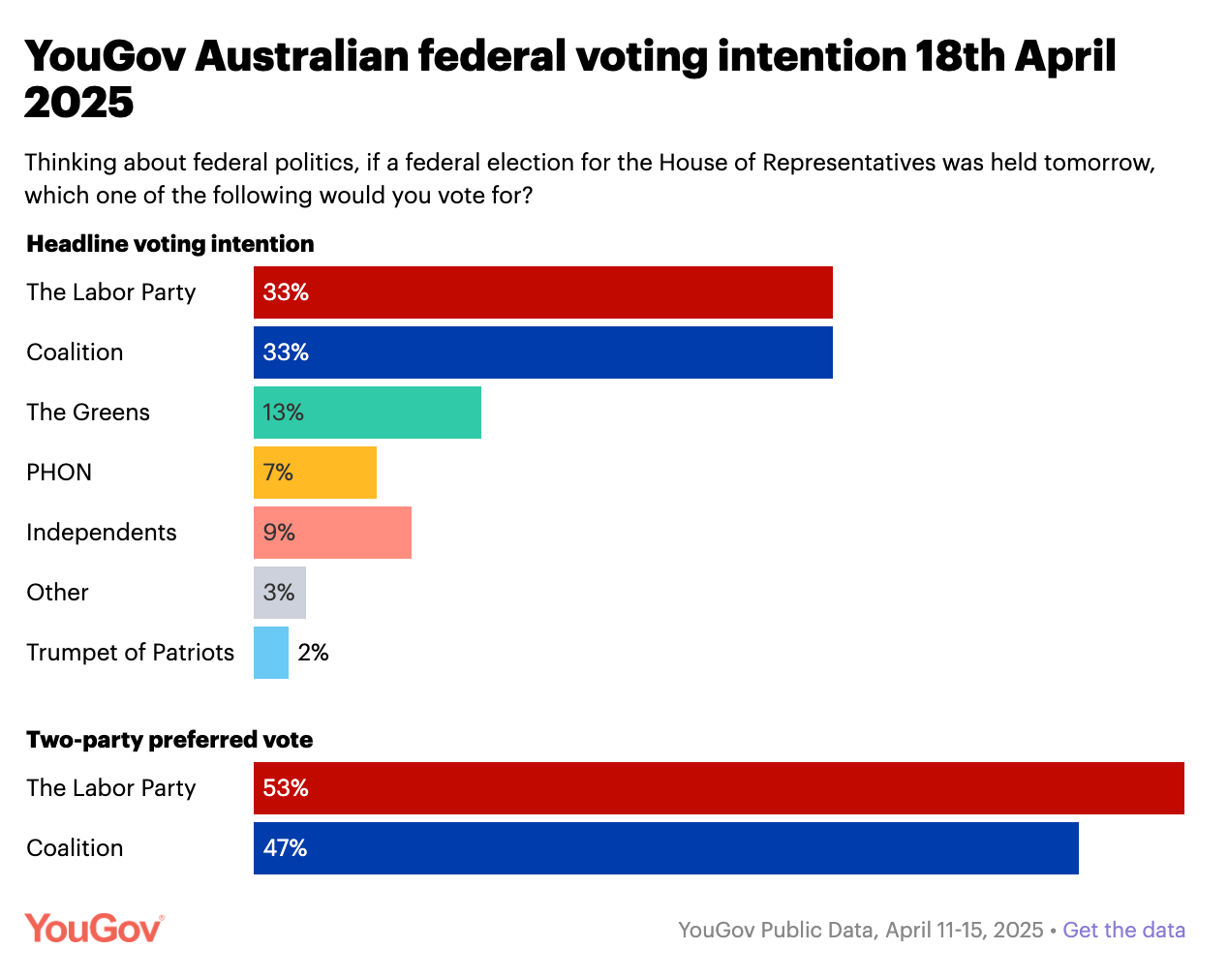The eternal vulnerability of democratic governments
And why humility is the key to longevity
When I wrote my recent piece about the Liberals being a hollowed-out husk of party, I didn’t think they’d take it as a challenge to prove me right. But since the article appeared, everything they have done in the campaign has borne out my analysis. Most importantly, the electorate has noticed what an empty vessel they really are.

Back in February, in a private chat with a well-known electoral analyst, I wrote, “I'm starting to get the impression that Dutton has overplayed the Maga-approach, that maybe all that shit doesn't play as well here and that Labor might squeak in another small majority? I don't mean there is any particular love for the government, just that, in the privacy of the booth, enough people who might want a change will decide they don't really want Dutton. To put it another way, that floating third of voters who no longer vote for Labor/LNP reliably might land in any number of ways depending on what alternatives are available in a given electorate, but I’m starting to feel that Dutton doesn't do it for them.”
If the recent opinion polls are right, that estimation is proving to be correct, and it seems Labor will manage to hang onto a majority. If that happens, not only will the Libs will be looking for a new leader, but the forces of Australian conservatism and capital will be looking for a new political strategy that, for the first time since 1949, will not have the party of Menzies at its core.
That’s quite incredible, though I’m going to save a full analysis until after the election.
Anyway, in the event of a Labor victory on May 3, Anthony Albanese will take a well-deserved victory lap and we will no doubt hear…again…about his belief that people always underestimate him. Fair enough, I guess, but he needs to be careful not to learn the wrong lessons from such a victory. There is genuine credit due in staying upright when your opponents are falling over all around you, but you need to remember you are still Steven Bradbury, not Usain Bolt.
What is absolutely clear is that whatever the composition of our next government, a steady-as-she-goes approach will not be good enough, and this is worth lingering on a little. Labor, the Greens and the more progressive independents all need to internalise the fact that people are in the mood for major reform.
America teaches us many lessons about the vulnerability of democracies, but surely a key lesson we should learn at the moment is that gentle, steady-as-she-goes centrism is no match for a determined movement of authoritarianism. We should also learn that people are not afraid of big policies, big change, and that they are looking for real alternatives to the sort of neoliberal managerialism that parties like the Democrats (and our own Labor Party) have come to embody. People know the last forty-odd years of policy has backed us into a cul de sac of massive inequality from which has arisen nearly all the problems that beset us and that this needs to be addressed, and they want something done about it.
Donald Trump’s genius was that he was able to capitalise on this desire for big change and somehow convince a plurality of Americans that he had the interests of the majority at heart. That he was able to do this speaks to his ability as a conman, but also to a long history of American libertarianism that was surprisingly easy to convert to authoritarianism, as well as a hollowing out of the democratic state occasioned by a massive concentration of wealth that was able to reshape Congress, the High Court, and most of the states in ways that pursued the interests of the megarich over the interests of nearly everybody else.
Australia has headed in a similar direction, but the broader, and happier, picture emerging here as we approach election day is that enough people in country—those the mainstream media routinely characterises as disengaged, even ignorant—have recognised the threat Peter Dutton represents. They may not be across the specifics of policy formation, but they are more than aware that someone who identifies himself and his party with Donald Trump and the Maga movement is not to be trusted with Australian democracy.
The Trump con didn’t work here, but that doesn’t mean Australians aren’t hungry for substantial change, that the country doesn’t need substantial reform, or that we aren’t vulnerable to the sort of rot that has arisen elsewhere.
We can’t kid ourselves.
The puncture in the body politic caused by the collapse of the Liberal Party will need to be sutured with something more than good intentions and lip-service to doing the right thing. Such a wound will attract a fascist infection at a rate of knots and it will be hard to stave off. It will need to be met with an equal and opposite force. That is to say, what replaces (or transforms) the Liberals is likely to be more extreme than what exists now, and so Labor—and whomever else is in power—will need to offer something more than incrementalism.
My personal belief is that such a challenge will be impossible for an Albanese-led Labor Party to meet alone, and that it why I am still hoping for a minority government of Labor, Greens and independents.
Even if they do win in their own right, Labor will hold power with a primary vote of barely a third of the electorate. That is to say, two-thirds of the country will have voted for somebody else. This is fine and it’s how our system works, but my god, it should be a hedge against ay temptation to hubris.
If Labor gets over the line, it will only be because of preferences, and the government they form needs to recognise that fact in their bones. They will have been handed a huge opportunity to build a genuine bulwark against the sort of raging authoritarianism that is powerful everywhere in the world at the moment, but they need to recognise that any victory is not theirs alone.
This means that, even with a majority of seats, Labor will need to govern in a much more collaborative fashion than victors in Australian elections tend to do. All talk of mandates should be off the table and a genuine effort to address the big issues—from housing to climate change to our relationships with China and America—should dominate the next term.
You can’t tread water in a raging river.
The bottom line is that the trend away from the major parties will continue and extinction is waiting for any party that fails to recognise that the key to political longevity is the humility of genuine deliberation.





A crucial step in the growth of LNP hubris was the defeat of the Voice referendum. The outcome was the perfectly predictable result of the one-size-fits-all negative strategy “if you don’t know, vote No”, aided by an appallingly weak campaign from Albanese*. But having won on the “Don’t Know” vote, the LNP convinced themselves that they had mobilised an anti-woke majority. #auspol
* who in turn was massively overconfident because of Labor’s win in the Aston by-election
For me TD with what you write here would be a disaster: 'If the recent opinion polls are right, that estimation is proving to be correct, and it seems Labor will manage to hang onto a majority'. We/Australia is running out of time to address the totality of issues that need addressing - ecological collapse, housing, inequality, defence/AUKUS etc etc really can't wait. Another 3 years of dilly-dalliance would be a great diservice to younger people who will be inheriting this s***-show as boomers exit stage left.
What I would like to see even starting now is a big focus on the big con being orchestrated by the duopoly and their enablers the MSM. It would be an honest discussion on how the duopoly is about careers and career politicians, corporations and the corporatisation of Australian politics. I may have this totally wrong and researchers who study this stuff may have convincing arguments that the 2party system is the best way to effect fair governance of Australia.
In closing would I be correct in surmising that there is a certain amount of nostalgia for the 2parties : 'trend away from the major parties will continue and extinction is waiting'.
This almost seems that there is advice they should take on board to avoid oblivion? Could it be that the 2party system could still work if we had leaders and parties who heed; 'key to political longevity is the humility of genuine deliberation'. Genuinely interested in exploring this. Cheers